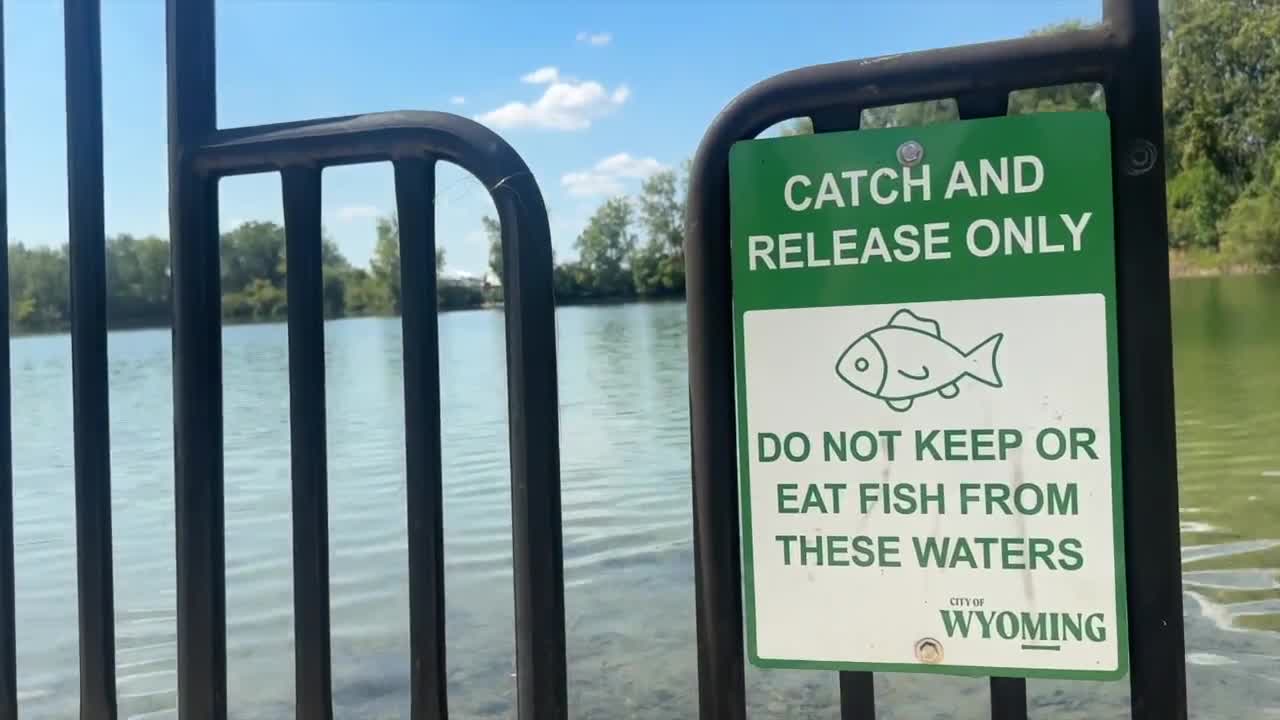WYOMING, Mich. — The Michigan Department of Environment, Great Lakes and Energy (EGLE) has designated parts of Wyoming and Kentwood as a special area of interest due to elevated levels of PFAS chemicals found in local fish populations.
While the contamination won't affect drinking water, with a system coming from each respective city, it has led to catch-and-release fishing restrictions at several popular spots, like Battjes Park and Lamar Park in Wyoming.
With Old Farm Pond in Kentwood also seeing elevated levels of PFAS in the tested fish species.

"My best catch out of here was nine. It's all catch and release, which I do pretty much anyway, unless I'm camping, then I want to eat them," said Scott, a local angler who frequents Battjes Park.
Battjes Park became a designated catch-and-release spot in 2023 after EGLE discovered PFAS chemicals in many of the fish there.

Health risks drive fishing restrictions
PFAS are man-made chemicals often called "forever chemicals" because they're extremely difficult to break down naturally.
"If we went to any of your viewers' homes, we could probably point out hundreds of items in their home that have PFAS in them, or PFAS was used in their manufacture," said Michael Jury, a PFAS specialist with EGLE. "So they're very ubiquitous. They're everywhere." Jury said.
WATCH: PFAS contamination prompts 'Do Not Eat' fish advisories in Wyoming parks
The health risks from ingesting PFAS are significant, said Lisa Fischer with the Michigan Department of Health and Human Services.
"Changes in immune system response, and then an increased chance of cancer, especially kidney and testicular cancers," Fischer said. "Consumption of those fish could increase your risk of negative health outcomes. So that's why we're recommending to do not eat for all species, for those water bodies."
Study identifies contamination hotspot
A recent EGLE study identified bodies of water in Kentwood, Wyoming and Grandville as having particularly concerning PFAS levels.
"The levels of PFOS, which is a type of PFAS that were found in fish from several the water bodies in this area, were elevated to the point that we would issue a do not eat advisory," Fischer said.
While there's no exact source identified for the contamination, but EGLE has said business in the area could be using PFAS in their water runoff, but the groups goal is focusing additional resources on the area to determine the cause.
"The best way to tackle the problem was to create an area of interest so that we can marshal all resources from all the different state departments and all the different divisions in EGLE to tackle this as a big problem, a big problem that it is," Jury said.
Despite the contamination concerns, some anglers like Scott plan to continue fishing in the area.
"It doesn't change me coming here, but it's depressing knowing that we can't take care of our planet," Scott said.
EGLE will host a public meeting at Wyoming City Hall on September 24 and the city plans to install additional "Do Not Eat" signs to inform residents about potential dangers in the water.
This story was reported on-air by a journalist and has been converted to this platform with the assistance of AI. Our editorial team verifies all reporting on all platforms for fairness and accuracy.






